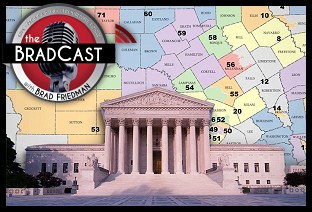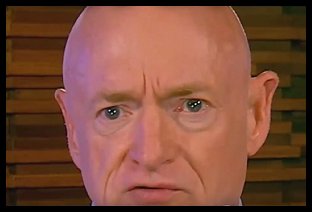 California's Proposition 61, "the Drug Price Standards Initiative", is simple and straightforward. It mandates that any California state agency that provides funding for prescription drugs may not pay more than the lowest price paid for the same drug by the U.S. Department of Veterans Affairs.
California's Proposition 61, "the Drug Price Standards Initiative", is simple and straightforward. It mandates that any California state agency that provides funding for prescription drugs may not pay more than the lowest price paid for the same drug by the U.S. Department of Veterans Affairs.
PhRMA, the powerful drug industry lobbying organization, opposes the measure, and is using blatantly dishonest television ads, such as this one featuring Marine Corps Veteran Lamont Duncan, to claim that the measure will increase the price the VA pays for prescription drugs, harming veterans in the bargain...
The ad leads viewers to the same erroneous assumption presented by the state's Legislative Analyst (emphasis added) --- that "drug manufacturers might choose to raise VA drug prices" in response to passage of Prop 61. Worse, the ad erroneously suggests that veterans themselves could be forced into higher co-pays.
As Senator Bernie Sanders, the former chairman of the U.S. Veterans Affairs Committee,
Conservative economist Greg D'Angelo, from Heritage Foundation's Center for Health Policy Studies confirms Sanders point in this explanation published some years ago: "The VA's discounts are mandated by [federal] law." Drug manufacturers lack the power to so much as "negotiate" a higher VA price, according to D'Angelo, let alone unilaterally raise them. And, as Sanders adds, "veterans' drug co-payments are fixed and do not rise even if drug prices go up." In cases where their treatment is for a service-connected condition, veterans "pay no out of pocket costs whatsoever for prescription drugs," the Senator notes.
While Prop 61 is subject to valid concerns, as explained below, under existing federal law, a betrayal of the right for affordable pharmaceuticals to Veterans is not one of them...
Yes on 61
The "Yes on 61" coalition, whose supporters, in addition to Sanders, include Robert Reich, Progressive Democrats of America, the California Nurses Association, AARP, the AIDS Healthcare Foundation and the California Urban League, countered with a truthful ad that also featured a group of veterans...
This position was supported by the Sanders who also made short work of a separate PhRMA ad campaign in which the drug companies inconsistently complain that Prop 61 should be rejected because it doesn't go far enough. Less than 20% of Californians would experience reduced drug prices under Prop 61, according to the No on 61 campaign. That argument, according to Sanders, overlooks the fact that "the measure would save [California taxpayers] an estimated $1 billion a year."
California is not the VA
Neither Sanders nor the "Yes on 61" campaign adequately address the one valid concern that was raised by the state's Legislative Analyst.
As Heritage Foundation's D'Angelo observed, drug manufacturers cave to VA price controls because the federal government has the power to deny the drug manufacturer access to other more lucrative federal markets, like Medicaid. "The VA does not use its buying power to negotiate with drug companies for lower prices," D'Angelo observes. "Instead, the government, acting through the VA, uses its power to deny manufacturers market access as a way to extort lower prices."
The use of the word "extort" by a market fundamentalist like D'Angelo is a bit over-the-top, especially when measured against the extortion-like tactics of a company like Mylan, which leveraged life-threatening allergic reactions as an excuse for a 600% increase in the price of the EpiPen. But the critical point is that, because the federal government has the power to deny market access, it has the ability to compel pharmaceutical companies to comply with VA price controls. Neither California nor any other state possesses the power to deny drug manufacturers significant market access. Thus, there is a possibility that a drug manufacturer could respond to a state agency's VA-like pricing by refusing to sell to that state agency, both eliminating drug availability and reducing the amount of projected savings, which is estimated by state analysists to be as much as $1 billion per year.
Not a Level Playing Field
Voters may or may not be persuaded to vote against Prop 61 because a greedy pharmaceutical industry suggests they may be willing to jeopardize the health of our citizens by refusing to sell prescription medications at VA discount prices. But instead of facing that choice, voters are being deceived by the blatantly false claim that passage of Prop 61 will harm Veterans.
While the "Yes on 61" advocates have attempted to counter that falsehood, their voice has been drowned out by PhRMA's well-funded and misleading claims on a playing field that is by no means level. As of Oct. 27 the pharmaceutical industry had contributed nearly $109 million to defeat Prop 61 whereas the "Yes on 61" campaign had raised less than $15 million.
Disturbingly, not all of those PhRMA dollars went to media ad buys. As revealed by Lee Fang, "three of the veterans groups that endorsed the No on Prop 61 and appeared in the television advertisement against the measure...all received direct payments from the PhRMA fund."
It is a circumstance that highlights the deficiencies brought on by money in politics.
Enacted during the progressive era, California’s initiative and referendum process envisioned an exercise in direct democracy that would counter the economic and political power of wealthy corporations like the Southern Pacific Railroad. Unfortunately, those early reformers failed to anticipate the ability of 21st century corporate wealth and power to undermine this form of direct democracy via unlimited spending on deceptive propaganda and outright lies that are presented via political campaign ads, which go unchallenged by an ethically-compromised commercial electronic media. A television station that aired such an ad and then exposed the lie would be biting the hand that feeds it.
Regardless of whether Prop 61 passes or is rejected, PhRMA's outrageously false scare tactics should serve as a wake up call to all Californians that media and campaign finance reform will be needed in order to accomplish the direct democracy promise of the initiative and referendum process.
Ernest A. Canning is a retired attorney, author, Vietnam Veteran (4th Infantry, Central Highlands 1968) and a Senior Advisor to Veterans For Bernie. He has been a member of the California state bar since 1977. In addition to a juris doctor, he has received both undergraduate and graduate degrees in political science. Follow him on twitter: @cann4ing


 SCOTUS Ruling a How-To for Unlawful Gerrymandering on 'Eve' of Critical Election Year: BradCast' 12/17/25
SCOTUS Ruling a How-To for Unlawful Gerrymandering on 'Eve' of Critical Election Year: BradCast' 12/17/25 Bricks in the Wall:
Bricks in the Wall: 'Green News Report' 12/16/25
'Green News Report' 12/16/25
 'This One Goes to 11': Weekend of Violence, Tragic Murder of Rob Reiner: 'BradCast' 12/15
'This One Goes to 11': Weekend of Violence, Tragic Murder of Rob Reiner: 'BradCast' 12/15 Sunday 'WTF?' Toons
Sunday 'WTF?' Toons Trump Now Losing One
Trump Now Losing One 'Green News Report' 12/11/25
'Green News Report' 12/11/25 Dems Continue Stunning 2025 Election Streak: 'BradCast' 12/10/25
Dems Continue Stunning 2025 Election Streak: 'BradCast' 12/10/25 Petrostates and Propagandists Undermining Climate Science: 'BradCast' 12/9/25
Petrostates and Propagandists Undermining Climate Science: 'BradCast' 12/9/25 'Green News Report' 12/9/25
'Green News Report' 12/9/25 The High Cost of Trump's Terrible Policy Making: 'BradCast' 12/8/25
The High Cost of Trump's Terrible Policy Making: 'BradCast' 12/8/25 Sunday 'All in a Day's Work' Toons
Sunday 'All in a Day's Work' Toons Dems Fight to Avoid the GOP's Massive, Year-End Health Care Cliff: 'BradCast' 12/4/25
Dems Fight to Avoid the GOP's Massive, Year-End Health Care Cliff: 'BradCast' 12/4/25 'Green News Report' 12/4/25
'Green News Report' 12/4/25 A 'Flashing Red Warning Sign' for GOP: 'BradCast' 12/3/25
A 'Flashing Red Warning Sign' for GOP: 'BradCast' 12/3/25 Hegseth, War Crimes and DoD's 'Politicization Death Spiral': 'BradCast' 12/2/25
Hegseth, War Crimes and DoD's 'Politicization Death Spiral': 'BradCast' 12/2/25 Follow the
Follow the  With Thanks, No Kings and Good Cheer
With Thanks, No Kings and Good Cheer Presidential Illegality and Duty to Disobey
Presidential Illegality and Duty to Disobey President of United States Calls for Killing Democratic Officials: 'BradCast' 11/20/25
President of United States Calls for Killing Democratic Officials: 'BradCast' 11/20/25 Is MAGA Finally Beginning to Fall Apart?: 'BradCast' 11/19/25
Is MAGA Finally Beginning to Fall Apart?: 'BradCast' 11/19/25 Trump's Terrible, Horrible, No Good, Very Bad Week: 'BradCast' 11/18/25
Trump's Terrible, Horrible, No Good, Very Bad Week: 'BradCast' 11/18/25
 VA GOP VOTER REG FRAUDSTER OFF HOOK
VA GOP VOTER REG FRAUDSTER OFF HOOK Criminal GOP Voter Registration Fraud Probe Expanding in VA
Criminal GOP Voter Registration Fraud Probe Expanding in VA DOJ PROBE SOUGHT AFTER VA ARREST
DOJ PROBE SOUGHT AFTER VA ARREST Arrest in VA: GOP Voter Reg Scandal Widens
Arrest in VA: GOP Voter Reg Scandal Widens ALL TOGETHER: ROVE, SPROUL, KOCHS, RNC
ALL TOGETHER: ROVE, SPROUL, KOCHS, RNC LATimes: RNC's 'Fired' Sproul Working for Repubs in 'as Many as 30 States'
LATimes: RNC's 'Fired' Sproul Working for Repubs in 'as Many as 30 States' 'Fired' Sproul Group 'Cloned', Still Working for Republicans in At Least 10 States
'Fired' Sproul Group 'Cloned', Still Working for Republicans in At Least 10 States FINALLY: FOX ON GOP REG FRAUD SCANDAL
FINALLY: FOX ON GOP REG FRAUD SCANDAL COLORADO FOLLOWS FLORIDA WITH GOP CRIMINAL INVESTIGATION
COLORADO FOLLOWS FLORIDA WITH GOP CRIMINAL INVESTIGATION CRIMINAL PROBE LAUNCHED INTO GOP VOTER REGISTRATION FRAUD SCANDAL IN FL
CRIMINAL PROBE LAUNCHED INTO GOP VOTER REGISTRATION FRAUD SCANDAL IN FL Brad Breaks PA Photo ID & GOP Registration Fraud Scandal News on Hartmann TV
Brad Breaks PA Photo ID & GOP Registration Fraud Scandal News on Hartmann TV  CAUGHT ON TAPE: COORDINATED NATIONWIDE GOP VOTER REG SCAM
CAUGHT ON TAPE: COORDINATED NATIONWIDE GOP VOTER REG SCAM CRIMINAL ELECTION FRAUD COMPLAINT FILED AGAINST GOP 'FRAUD' FIRM
CRIMINAL ELECTION FRAUD COMPLAINT FILED AGAINST GOP 'FRAUD' FIRM RICK SCOTT GETS ROLLED IN GOP REGISTRATION FRAUD SCANDAL
RICK SCOTT GETS ROLLED IN GOP REGISTRATION FRAUD SCANDAL VIDEO: Brad Breaks GOP Reg Fraud Scandal on Hartmann TV
VIDEO: Brad Breaks GOP Reg Fraud Scandal on Hartmann TV RNC FIRES NATIONAL VOTER REGISTRATION FIRM FOR FRAUD
RNC FIRES NATIONAL VOTER REGISTRATION FIRM FOR FRAUD EXCLUSIVE: Intvw w/ FL Official Who First Discovered GOP Reg Fraud
EXCLUSIVE: Intvw w/ FL Official Who First Discovered GOP Reg Fraud GOP REGISTRATION FRAUD FOUND IN FL
GOP REGISTRATION FRAUD FOUND IN FL

































